#the way the bottom one actually looks like fitzjames
Explore tagged Tumblr posts
Text

WAIT HAS THIS BEEN DONE YET
#circa episode 4#the way the bottom one actually looks like fitzjames#just the template as is#also why is crozier actually hard to draw#whats even his hair color#francis crozier#james fitzjames#fitzier#the terror#the terror amc#froggerart#I love being able to just make cursed stuff
236 notes
·
View notes
Text
been seeing a lot of people do these with their special interests recently so i thought i'd throw my hat in the ring
The Terror as Zenless Zone Zero Agents
(with very little explanation because i think it's funnier that way)


Francis Crozier — Ellen Joe
would rather be doing something else + ocean association + old, beaten-up uniform + one of the most powerful characters but doesn't want to be


James Fitzjames — Nicole Demara
started from the bottom now we're here + style queen + big ass gun + better than people give them credit for + initially annoying but they grow on you


Thomas Jopson — Von Lycaon
i think this one is obvious + leg injury + dog symbolism + look this is literally a hot demure white wolf butler idk what to tell you
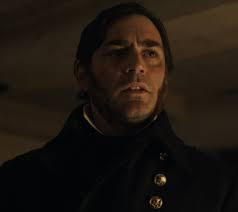

Edward Little — Ben Bigger
imposing figure but doesn't want to be + just wants to do his job + actually kind of shy but doesn't feel like he can be vulnerable + this bear is an accountant (genuinely) and that feels very little


George Hodgson — Nekomiya Mana
chatty as hell + motivated by food + this catgirl used to be part of a gang and deflects from her trauma by doing an exaggerated cute catgirl act + she would prefer not to but she keeps knives in her boots for stabbing if necessary (and she's good at it)


John Irving — Hoshimi Miyabi
quote from her agent profile "goes on a lot of field missions and still doesn't know which floor the regular monthly meeting is on" + haunted by demons (gay) vs haunted by demons (literal) + aloof/serious but tries to connect with average folks anyway + very dedicated to one thing
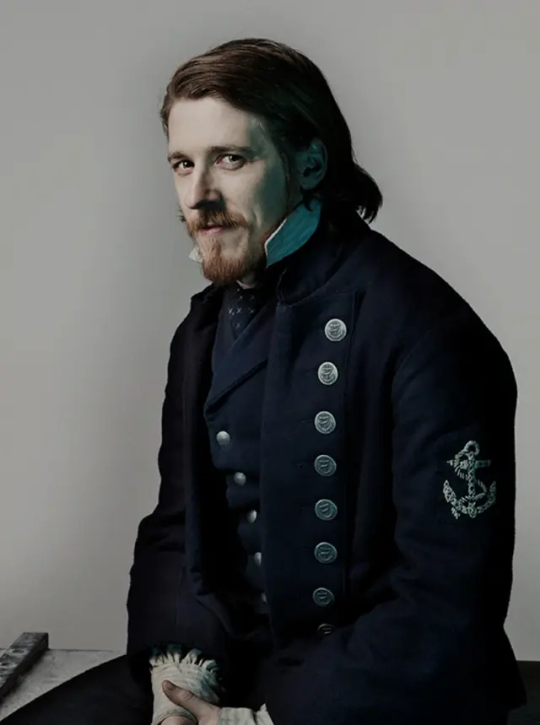

Cornelius Hickey — Jane Doe
nobody knows their real name + rat + joined a gang and then betrayed all of them + fan of knives + weird psychosexual relationship with a dogboy


Solomon Tozer — Seth Lowell
fighting people is his job + has a weird psychosexual relationship with a rat + really dedicated to his friends + would rather protect than hurt + seth didn't join a gang but he did get kidnapped and chained up by one that jane was part of so i think that's close enough
like & rb for a part 2 perhaps... hehe
#jupiter.txt#myler.txt#the terror#zenless zone zero#francis crozier#james fitzjames#edward little#thomas jopson#george hodgson#john irving#cornelius hickey#solomon tozer
8 notes
·
View notes
Text
>heading back up on deck Fuck that guy. Fuck all of that guy. Fuckkim. Fuckkim to hell n back. Hate that guy. Hate him. Don't want him in my life. Should've stayed dead. Should've...
>he's at the bottom rung of the ladder, and he realizes he's alone. Is everyone on deck? He stops for a second, wavering, and maybe it's the emotions crashing over him, maybe it's the sudden guilt and pain he feels at ending this, maybe it's the way James Mr. Fitzjames had looked at him, like he'd killed him, maybe it's realizing he actually doesn't want him dead, maybe it's just how fucking tired he's been, maybe it's the emotions from getting gore back, maybe maybe maybe, but he just. Feels like crying. Suddenly. Out of nowhere
>he drops his hand off the rungs of the ladder and puts his hands on his face and tries desperately to control himself. Pats himself a little bit, trying to regain his composure, but it's not working
>there's one, completely monumental thing on his mind, suddenly, and it takes over body and soul, and he just can't breathe. Fuck. Jesus fucking Christ, don't cry, don't do it, don't—
>the sobs hiccup in his chest anyways. Stop, he thinks, stop, but god... fuck... he can't go up on deck like this. He has to. He can't, but he has to but he can't but— hhgbbgghhhh why did Georgie leave him? Why the fuck did he leave him??? He can't stand being without him, he hasn't seen him in two weeks, he feels like he's going to die. Fuck... oh my god fuck... he needs him, he needs him, god... fuck... he'd been trying to isolate himself from him to just drive it home that yeah fuck you, I'm punishing you for rejecting me, but... he doesn't want to do that... he misses him... he wants him... he was the only thing... god... oh god...
>he has to see him. He has to. He can't live if he doesn't, he just can't.
2 notes
·
View notes
Text
A Little Response to Rhavewellyarnbag's latest Review of The Terror's "Horrible from Supper" (the italics are me)
Being another look at The Terror, episode 01x07, “Horrible From Supper”. But first, the characters in The Terror to whom I own an apology for the things I said last night when I was drunk, in ascending order of how vile it was: Francis. Yes, what I said was true, but I should not have said it. Goodsir, on general principle, because he is a nice man, and doesn’t deserve to have the likes of me talking about him that way. Author’s note: Only daily do I apologize to Harry Goodsir (fictional) for the things I say about him, and to Harry Goodsir (nonfictional) for the things I say about a fictionalized version of him. I like to think that the former would forgive me, but I think that the latter might not. I painted him from the few photos made of him; he has a delightfully reproachful look. Resting bitch face, even.
In the 1845 photos, his eyebrows come together in a way which could be interpreted as judgmental. But, when we think of the trials of sitting for a daguerreotype at that time (not nearly as jolly and pain-free as depicted in “The Ladder” –forgetting about the subsequent Tuunbaq attack) Goodsir’s reproachful look might merely result from the tedium of having his picture taken (or that fatal tooth was beginning to hurt). Tozer. Though, again, I meant it, and, like, look, I defy you tell me that he doesn’t look absolutely stunning when he’s afraid for his life in “Terror Camp Clear”.
“The Terror” certainly broadens the parameters of handsome-ness. Tozer, while listening to Morfin singing “The Silver Swan”, is more attractive than, than, than the Moon! Or the Pyramids! He’s supernatural.
The ship before it weighs anchor, before it, in some fundamental way, becomes a ship. Not yet having fulfilled its function, it is more like a theatrical set. The notion of limbo is a fitting one: the men descending the ladder, coming from the bright, noisy world above, could be entering the afterlife.
Who’s the cat who does the words about utter existentialism? Rod Serling, was that his name? Did everyone see his episode of “The Twilight Zone” about the toys in the Salvation Army barrel? Yikes.
Nothing is working as it should, logic is suspended, and the topsy-turvy world of the carnival will become real.
The movie “Topsy-Turvy” is a great favorite of la famille Sunbeam. Even so, there are useful parallels between that film and “The Terror”: class clashes, pretense and pageantry, and mainly ripping away the fine lace mask of the Victorian era. The attitude of the servants in both shows is strikingly craven.
“Any tips, sir, for a first-timer?”
In the super-heated world of fandom, “any tips for a first-timer” sounds like the sort of pick-up line EC would use on the true Cornelius.
Poor Morfin.
Morfin is “The Terror’s” equivalent of the Victorian Little Nell. Headaches, bad teeth, song-forgetter, probably a once-in-a-lifetime sodomite but nevertheless flogged for it. When he and Tozer go out on that exploratory mission, he falls flat down and Tozer says something like “Don’t volunteer if you don’t have the bottom for it.” (More heat for the fandom). And he gets to be the first to see the severed heads. (Who thought Tozer and Morfin would make a good team for this task? Did they draw names?) “Gently with that one, please.” It’s a little bit insensitive of Goodsir to express concern for his luggage before he does, Morfin, after Morfin’s just collapsed from pain, only looking like the living dead. That trunk, though, is Jacko’s tomb.
Harvey, your theory about Goodsir’s, ah, class-related selfishness is confirmed here.
“Are these our choices, Cornelius, or are they being made for us?” Gibson seems to falter, which is interesting. His idea to separate from the larger group doesn’t seem to be his own, which suggests that Hickey understood that it couldn’t be seen to have come from him. Gibson looks like death warmed over, but Hickey is just as perky as ever.
Gibson seems to get on-and-off injections of great intelligence, but his death-warmed-over look is consistent through the series.
Hickey is also under-dressed, not even wearing a hat.
This is perhaps a very English-major thing to say, but there is a suggestion of a climate change (or a massive change in consciousness) occurring after Carnivale, as if the trauma of the fire left living dead who can no longer feel the cold, or, having felt so much fire, the survivors have had the idea of cold burnt out of them.
He does sometimes dress more appropriately, as in “A Mercy” when he was helping Hartnell transport supplies for the carnival. Suggesting that, in this scene, Hickey means to maximize his attractions. The obvious beneficiary is Gibson, but I think Hickey sees some value in displaying himself for Tozer, the one Hickey is really after, and has been since at least “Punished As A Boy”.
A sexy thought; how much nudity the men would crave. When Hickey is flogged, he is completely exposed to the men present, and I think the sexuality of his having his pants pulled down really hits the sailors hard. Francis alone looks like he’s going to climb out of his skin with the ferocity of his feelings (I won’t say desire, but that’s what I mean). Was it you, Harvey, or someone else who discussed how strong the thirst for touch must be among the Franklin Expedition? I imagine the thirst to see bodies is just as powerful.
Then, I was immediately resurrected by the peek at Collins’ suspenders. He is... built like a cement outdoor commode. There is a lot of Collins to love.
The suspenders become iconic. Collins is one very alluring sailor, even in his bulky sea-diving outfit with that great furry head sticking out. Yet his sexuality seems neutered, compared to the other significant sailors (Still, if Hollywood decided to make a chubby “Wuthering Heights”, Collins would make the perfect pudgy Heathcliff.) Author’s note: I don’t think Francis thinks very much of Goodsir, and the feeling is mutual. Goodsir has to obey Francis, but it’s duty without devotion, without deference, Goodsir having seen very little that would indicate to him that Francis has reformed himself. Francis may have stopped drinking, but he’s up to his old tricks, dismissive unless he wants something, ingratiating when he does. This is the way that Francis behaved toward Hickey, which gives an interesting contrast between Goodsir and Hickey: once Goodsir understands Francis’ motives, he’s no longer taken in; Hickey must understand that Francis was only drunk and trying to get into Hickey’s pants, but Hickey continues to try to make Francis like him.
Francis might resent Goodsir’s place in society, so settled and unique, while Francis himself has to maneuver around Sir John and James and all the rest. But Hickey he can control. (In a way, it’s a shame that Irving, the stupid old king of coitus interruptus, has to bust in again. It would be in vain, and yet interesting, to consider what might have happened if that seduction had been consummated. Think of the bickering harem Crozier could assemble: Hickey and Jopson and Gibson and then Irving, etc etc. (But this speculation, that a captain would handpick a seraglio of sailors, is ruined by the knowledge that, despite all the porn stories and movies, there is no one a teacher would want less to seduce than her students.)
James has to move his little pick ax from one hand to the other to reach out to Francis, suggesting that, emotion aside, he made a conscious decision (his bones not yet reduced to broken glass) to grab Francis’ jacket, right over his heart, no less, and jostle Francis in a friendly manner.
This moment is comparable, to those who might be interested, to Star Trek: The Original Series’s “Amok Time” when Spock grabs Kirk by the arms. Quite the pensee could be written comparing Kirk-Crozier (the fair-haired captains) and Spock-Fitzjames, the haughty eyebrow-waggling second. The latter’s reserve is melted, melted utterly by his realization of how much he loves his Captain.
Author’s note: I am into Edward, but conditionally: I like him in that coat that makes him look substantial. Matthew McNulty is lovely, but he’s far thinner than I thought he was, which came as a bit of a shock.
His shortness is also quite astonishing. I can’t imagine Levesconte being involved.
Levesconte is too busy lying on his little officer’s cot, reminiscing about the time he said “benjo” and everybody cheered.
“There was a fourth man.”
I know you are referring to the raid on Silna in “Punished as a Boy”, but these words put one in mind of T.S. Eliot’s notes to the “Fire Sermon” in his “Wasteland”: “it was related that the party of [Anarctic] explorers, at the extremity of their strength, had the constant delusion that there was one more member than could actually be counted”. Ah, the hypnotic potency of the top of the world.
Did Edward just grab Irving’s knee? Judging by Irving’s expression, yes, I think he did. I think he leaves his hand there for the rest of the meeting. Actually, no, he does not, but he appears to again bring it down to the general vicinity of Irving’s lower body.
I have run this scene over again and again and again (like the Zapruder film), and I think Edward does make an aggressively intimate gesture: “left and to the back, left and to the back.” Irving does not seem displeased.
Hickey begins to assume what he imagines as Tuunbaq’s character. Having already, it’s implied, eaten part of Heather’s brain . . .
It is more probable that Hickey was just tapping at Heather’s brain, mainly because a brain IS not like a pudding; a pudding can be nibbled on without anyone noticing. But if someone nicks a part of a cathedral, which is a self-contained entity, it would be noticed by, at least, Nurse Tozer. Still Hickey might have tasted the cerebrospinal fluid, just for the Hickey of it.
When first aboard Terror, Hickey appears to be sizing up his new environment, but he also looks relieved, hopeful. It’s implied that he had a lucky escape from England, which had gotten too hot for him, but I think that he really believed that he was making a fresh start. Taking another man’s name was practical, perhaps a necessary evil, but I think that E.C. just didn’t want to be E.C. anymore.
I admire the symmetry of Hickey throwing a Neptune-sized bag down by Hodgson, thus startling him far more than one think a tough lieutenant would be startled.
Author’s note: . . Silna doesn’t fall into Goodsir’s arms, because there’s no reason why she would; she might like him, but he’s merely the least untrustworthy of a group of untrustworthy men who, by the end of the series, have not just made her home almost uninhabitable, but killed her father and her friends. Her discovery of Goodsir's body, the state it’s left in, confirms it: if this is what the British do to each other, she was lucky to get away when she did.
Hear hear!
By the way, if one is in the mood, another pensee could also be written about the real daguerreotypes of the Franklin expedition. I am particularly amused by Gore and Fairholme. Gore hates Lady Jane and this stupid thing she’s making him do. just so Sir John can be further exalted. Fairholme picks up the vibe and poses just like Gore, only he has to borrow the affable Fitzjames’ jacket.
I think we’ve all been there.
17 notes
·
View notes
Text
Closer, Chapter Four: Kink - Bonus Features
Chapter four of Closer, the first installment in Somewhere in Canada (the Terror kink AU)... is now up! It's a plot-heavy chapter! There's some platonic kink! There's the plot to an entirely different story if you squint!
Technical notes first, story notes after, line notes to finish it all up.
Alright, here we go.
Technical Considerations:
Chapter Titles: So I didn't have any particular chapter titles in mind when I started this story. The original structure I'd planned for was one chapter for Friday, one for Saturday, one for Sunday, with Jopson POV at the very beginning of chapter one, and then again at the very end of three.
Obviously, uh, there was too much story for that to fly. So I cut it where I needed to cut it, and swapped my structure to have Jopson POV at the beginning of every chapter (and bonus Jopson POV at the end of the chapter). So I needed five chapter titles. First I couldn't think of anything good, and then it occurred to me that I could name four of them after the RACK acronym (Risk Aware Consensual Kink), and then it was super fascinating from a storytelling perspective because of the way the chapters lined up. Like, Risk deals with the risks that Edward didn't take because he totally ducks out of talking to Jopson that first night. Aware covers them starting to know each other. Consensual covers the dungeon scene, Kink covers platonic kink, and also the very normal way that both of them have integrated kink into their regular lives, and how it leads to these intimacies that are normal for them, but would be strange from a vanilla perspective or in a vanilla relationship. And then, finally, since I needed a fifth chapter title, Aftercare seemed like the obvious solution, which cracks me up because the entire chapter is, uh, well. I mean, it's aftercare for them. But yeah.
Mornings: So I wanted the structure of this fic to be all chronological in order--ie, no re-covering events that have already happened from someone else's POV within the same fic. (The Tozer/Irving fic, obviously, will be covering many of the same events, but it'll be different enough that it won't matter.) Which led to an icky bit for me, because I split the chapters differently than I anticipated (see above), and needed to start the day out with Jopson-POV even though I already had this lovely Little-POV drafted out.
Thankfully, Jopson came in for the win with that one, because he's a morning person, and Ned isn't, and their alarms were set for different enough times that I could go right from Jopson's wakeup to Ned's wakeup without having to retread the same information or the same section of the day (technically, there's a small chronological overlap, I think Jopson is probably eating breakfast when Little is trying to resurrect himself from his bed, but I've decided I Don't Care).
The Three Bears' Bed: This is such a smol technical note, but I wanted to bring it up because it's one of the really fun things that you can do with deep POV. It's implied (and confirmed in the next chapter) that Jopson and Edward are in essentially identical hotel rooms. But if you squint--they both describe their beds very differently. Jopson's bed is "too big", ie, he clearly sleeps on a single at home, and it's probably not as nice as the hotel bed. Edward's bed, a carbon copy of the queen bed Jopson is sleeping in, is "too small", ie, he's clearly got a king-sized monstrosity for himself back at home. I absolutely live for these kinds of things that are literally too minor to be noticed (nor should they be, they're meant to fade into the background), but which communicate so much about the characters.
(Ah, god, there's going to be so much adjusting for them to do in London. Their lives are very, very different. Jopson is starting to clue in, and he's going to have to sit with that once he has a clear head and lets all the subconscious stuff he's been picking up on actually gel together. Right now, he's very much in the 'whoa that looks expensi--hooooly fuck Ned Little is hot' phase. He'll have a Moment in London, though, where he'll sit bolt upright in his single bed and go wait a minute he put fifties in the donation bin when I blacked his boots and didn't even blink, he just casually throws large denomination bills* around.)
*I grew up low income, and I never carry anything bigger than a twenty in my wallet. People who are used to having more money, in my experience, tend to carry larger bills in their wallets. I know a fifty isn't actually a large denomination bill, but it is when you aren't used to carrying that kind of money around. Fifties make me tense until I break them. If I have a hundred, it's because someone gifted it to me, and I am gonna stress about it until I get it to the bank to deposit. Twenties are good for me, thanks.
Story Considerations:
Jopson's Work Ethic: Jopson's work ethic is in full force here, and I love to see it. I also love to see how firm he is about not hiding it. Like, Blanky understands how rare it is for Jopson to find someone he connects with the way he connects with Nedward, and was perfectly willing to skip the dungeon* to give Jopson another go at it. But Jopson, at some point, has transitioned from 'perfect, a weekend hookup' to 'perfect, I would like Ned in my life always'. (Gonna guess it was that post blowjob cuddle-nap that tipped it over, to be perfectly honest.) And Jopson knows that for Ned to be in his life always, Jopson needs to be realistic with him about what his life actually looks like--so he's going to work the long hours that he usually works, and he's going to run Blanky's booth so that Blanky can head to the dungeon tonight, and when Edward asks to be told literally anything about Jopson's life, Jopson moves immediately to telling Ned about his job.
(You'll note that Jopson has a schedule for working in the morning, the afternoon, and also the evening, ie, decidedly more than an eight hour day/forty hour work week. He did not mention that he frequently goes to Terror, and then shows back up at three am to do more work in a haze of subspace, but I'm sure he'll get around to it.)
I think it's important to Jopson that Edward accept him as he is--that is, no arguing about what comes first (it's work), or what Jopson's priorities are (also work), or how much availability Jopson has for a relationship (all of it...after work). So in that sense, this is pretty much a trial by fire--Jopson is saying 'look, this is what my life is like, and if you fit, you can stay', and Edward, in turn, is saying 'please just let me sit next to you, I like it here'. (I'm sure Tozer would be irritable about Edward's changed loyalties if he weren't currently sorting out, you know, every bad decision he made the previous night).
*This is not a Blanky-specific thing. If Esther were here instead, she and Jopson would have the same arrangement. I think either Blanky or Esther would be equally fun to play with, don't you?
Duty and Responsibility: I also love the differing approaches to duty and responsibility, as displayed by Joplittle--Edward talks, multiple times, about his duties and responsibilities here as something that he needs to shoulder, like it's a too-heavy pack that he's hauling around behind him when he would really rather just pull the covers over his head and stay there. Jopson, however, is thriving under his.
I would posit that, perhaps, if Edward managed to distance himself further from Hickey's bullshit, that maybe his responsibilities wouldn't suck so much. But for Edward to get away from Hickey's bullshit, that would mean Tozer would also have to put his foot down, and Tozer has been ambivalent about doing that, so far.
Sadomasochism, and the ‘Gold-Star’ Dom: Oh, Edward, my sweetheart, my dear, you have a track record of dating terrible people, and hanging out with people who kinkshame you, and I am so sorry that it's come to this.
There's this really fascinating (by which I mean it's incredibly toxic) culture difference between old guard spaces and the "newer" spaces. For people Francis' age who grew up in old guard leather kink scenes, they would have come up in the scene submitting first, and then either continuing to submit, or transitioning into being a dominant as they gained experience. However, for newer spaces--and here, I'm talking about something that was starting to happen for people around Fitzjames' age--there started to be a shift toward just doing one or the other*. By the time we get to people in the same age range as Little**, Tozer, and Jopson, the emphasis on picking one or the other is much more prominent. You should 'know' your orientation when you enter the scene--and then that's typically where you stay. There's no requirement for a dom to have ever subbed--and there's no requirement for doms to be familiar with the business end of their implements either. (If I had a dollar for every talk I'd been to where a dom was proud that they've never actually tested gear on themselves, I would have a lot of dollars.)
This leaves Little in an awkward spot--he's got no interest in submitting (as per the way he nopes out of any sort of cuffs or protocol with James Clark Ross), but, unlike Tozer, who tolerates getting hit in the context of fighting but doesn't particularly like it, Little actively enjoys the pain of getting hit. Based on how awkwardly he discloses that to Jopson, we can infer (correctly) that it's gone down badly in previous hookups.
(The general stereotype that dominant-sadist-top*** and submissive-masochist-bottom are one scale instead of, you know, three different scales, is not helping Ned at all here.)
So Ned is in this spot as a sadomasochist dom where he's had a hard time finding a partner that is willing to accept that he has a masochist streak as well. Enter Jopson...
*I think, though I'm not sure, that part of this shift was kink culture moving into the straight scene as well. Heterosexual kink tends to avoid the formalized learning process, and focus strictly on I Have Always Been A Dom.
**For the purposes of kink!AU, I'm going with approximate show ages for everyone--I think I saw somewhere that historically, Little was older than Fitzjames--but I'm going with an older Fitzjames and a younger Little here, for Fitzier Reasons.
***Note that I’m talking about top and bottom in a BDSM sense here--the one who wields the flogger vs the one who has the flogger used on them. The penetrator/penetratee during intercourse is an entirely separate thing, which....you guessed it....is also unrelated to the above-mentioned scales.
Service: Jopson thrives when he's engaged in acts of service. I really loved working with the translation of canon-to-kink!Jopson, because it's really fascinating to dig into how those canon aspects of his personality translate. Like, the long hours as a steward translate directly to the long hours that he works for Francis. But those acts of service translate really easily into submission as well. (I would posit that, for people who pursue more 'lifestyle' kink as opposed to 'bedroom-only' kink, there's a great chance that they'll pursue jobs that play to those strengths.)
The particular benefit to this that's working in Ned's favour here is that Jopson loves nothing more than to arrange things for people to make sure they have what they need. So this intersects perfectly with Ned's typical methods for managing his top drop--if Jopson can leverage his connections to make sure that Ned has access to people that will let him bottom-but-not-submit for them when he needs it, well, that's a win for both of them.
(I would hazard a guess, if you squinted, that Ned is sexually monogamous, and generally dates other monogamous people, which sometimes makes the negotiation of play with other people outside the dyad a non-starter. I would also guess that Jopson wouldn't consider monogamy to be a particular value of his, and so anything he can do to make sure Ned is looked after is perfect for him.)
Top Drop: Pretty much any kink conference that even slightly touches on educational aspects will have a talk about subdrop, typically led by a sub or a panel of subs, or sometimes by a dom/sub pair, discussing how to properly care for one's sub, how to deal with subdrop, and all those coping kinds of mechanisms. I can guarantee Edward has attended a number of those talks, written at least one blog post, and probably could speak on it if you really bullied him into it.
Those same conferences typically do not talk about top drop. I've been to lots of talks on sub drop. I've only ever been to one on top drop, and it was so horribly done that we’re still talking about it years later. Even googling when I was brushing up on my research for this fic didn't give me much.
Anyways, it's good that Jopson works for Crozier, who treats drop as something that can happen to anyone regardless of position. In turn, this means Jopson is able to recognize it happening to Ned, and will just merrily bulldoze and/or gently bully Ned until he gets the information he needs to be able to help.
RACK and SSC: Ah, look, it's the author picking a pedantic fight in the middle of their fic using their POV character as a mouthpiece. SO. When I was first getting into kink in the early two thousands, SSC (Safe, Sane, Consensual) was the name of the game. It essentially means that the activities you do under the BDSM umbrella should fit all three of those criteria.
The issue that I and many others have with the acronym is that it doesn't particularly fit that well for a lot of the activities in BDSM. After all, what's really safe? You can trip walking down the same stairs that you've walked down every day of your life if your shoelace is loose, or if your ankle goes weird, or if you're just not paying attention. What's sane? No, really, what is it? What defines sane? Should we be using mental health terms to determine whether or not something is a good idea? What's the opposite of 'sane' in this context?
(I'm not gonna bicker about consensual, obviously, that one I still hold to.)
How do you practice edge play under SSC? Can you safely punch someone? Is it sane to do so? (God, I hate the inclusion of 'sane' in the acronym so much.) Can you consent to something that doesn't fit the first two criteria? If you decide an activity fits all three criteria, does that guarantee nobody gets hurt? (Absolutely not.)
So, there's a shift in the scene to use RACK instead--Risk Aware Consensual Kink. RACK is more focused on assessing the risks to specific activities, and consenting to do those activities even though the risk exists. You can definitely punch someone under RACK--because RACK supposes that you've discussed the risks of punching them, you're both doing your best to manage those risks, and you've both consented to the activity while recognizing that it’s inherently risky to do it and you’ve taken as many precautions as you can.
Sir John 'actually the expedition is outfitted for seven years and we don't need any rescue' Franklin is clearly focused on SSC, with an emphasis on no further risk assessments once a particular activity is deemed to be safe. This isn't to say that everyone who practices SSC ignores possible risks--but it is to say that the acronym doesn't encourage active risk assessment the same way that RACK does. (Doing X is safe, therefore, I don’t think about the risks while I do X, because it’s safe.) I personally think that RACK is a more robust way to assess kink activities, but, as you can probably infer from, you know, the entirety of this fic, I take part in a lot of activities that don't fit under SSC, so I'm biased.
I do not blame Edward one bit for getting into that argument with Sir John. I do feel pretty certain that Blanky surreptitiously filmed it, though, so that he can send it to Francis. I also am pretty sure that Francis’ own stance on RACK, which comes through pretty clearly in his books, would have informed Edward’s stance as well, so, you know, full circle there. (Do you have any idea how many people you’ve informally mentored via your books, Francis? It’s *cough*JamesFitzjamesAlso*cough* a lot.)
Florentine Flogging: Here's the reference video I was using for Florentine flogging! https://www.youtube.com/watch?v=CGCQGsxbwtw
Sharp eyes will notice that this is a very similar skillset to spinning poi, which I thought was really neat.
Line Notes:
Jopson will be back in six months to give his talk, and Edward is going to be right there in the front row to support him, and that means that nothing can go wrong this weekend.
It...doesn't actually mean that. I mean, obviously, yes, not being banned from Canada is a requirement. But not having the booth open wouldn't have killed anybody.
Irving dragged you home—please advise how, he’s half your size?
This is funnier once I did some googling and realized that Ronan Raftery is six goddamn feet tall, which makes him two inches taller than Matthew McNulty, but I decided to let Edward's inaccuracies stand because they're pretty goddamn funny. Also, I maintain that Irving gives off smol energy.
“Oh, good,” Irving says, the tension instantly melting off his face. “I’m so glad he made it to bed.”
Tozer did not make it to bed, but, tbh, I wouldn't correct Irving at this particular moment either. Especially not in front of Lady Jane Franklin.
“Who’s this, then?” Lady Franklin asks. She’s wearing a vintage dress from a decade Edward should probably recognize, but doesn’t. (Jopson would, he’s sure of it.)
The 1950s, Edward. It's literally the most easily recognizable decade.
“…he’s fine,” Edward says, more confused than ever.
Edward, Edward, Edward. Both more confused than ever--and completely unwilling to do any followup on this whatsoever, because why ask questions when instead you could eyefuck Jopson. (In a sense, though, this is Tozer's problem, so Edward's ability to disconnect from it completely is probably an improvement from, say, Edward of a few years ago.) Normally, leaving plot threads hanging like this would bother me extensively, but because I'm drafting the Tozer/Irving fic as we speak, I'm comfortable just letting all of this just hang for a bit. These plot threads are important to include because they happened, but they're not important to resolve, because Edward doesn't give a shit.
Nothing fancy—just Ned, with a little handwritten squiggle next to it that’s almost a heart, if you squint.
It's definitely a heart. Jopson just channeled the patented Francis Crozier technique of 'if I make a vague line here, people can interpret it how they want'. Not very characteristic of Jopson--but, as we discussed last week, poor boy is carting around some baggage re: his affection, so we’ll just let him have this.
It’s probably the goddamn bruise from yesterday’s fuckup. Well, that, and the fact that Tozer isn’t there. Or maybe Edward’s just fucking up something else that he’s completely unaware of.
I'd like to propose option four, which is that Edward is hot as fuck, dressed in leather, and was part of a scene that gathered a respectfully distant crowd in the dungeon the night previous. Edward is not aware that option four is an option, but I would like to reassure him that option four is, in fact, an option.
“What do you do for aftercare?” Jopson asks curiously. “Like—what did you do last night, after you walked me home?”
Bold of Jopson to assume that Edward spent two seconds looking after himself. (He won't make that mistake again--Edward's blog entry on aftercare was detailed enough that last-night!Jopson made the endorphin-blurred call that Edward had his own routine sorted, and is now finding out that Edward has no such thing.)
Edward sighs, starts to mentally assemble an apology. He’s done it again—let his guard down, said too much. The apology has never worked in the past. But he’ll have to try. There’s always a chance Edward will get it right this time, even though he’s not remotely ready for this (it was going so well), but he has to, he has to start, he’ll just—he’ll start by—saying—
In true Ed Little fashion, Edward is assuming that the reason this conversation has never gone well in the past is because of him, instead of the more rational suggestion that perhaps he's just trying to hook up with people who aren't actually compatible with him.
Jopson’s face is very pink. “Quite the mental image,” he says. He swallows, visibly. “You and Tozer were, uh. Both holding back during the demo yesterday, then.”
Ah, yes, the look and sound of a man who is rather quickly realizing that a wank fantasy he'd watched unfold in real time yesterday was actually just the tip of the iceberg.
Jopson’s eyebrows shoot up. “Why?” He scrunches his nose, frowns. “Was that meant to be a joke?”
Can't get all sad about Edward's past of attempting to have relationships with people he wasn't compatible with until we also get sad about Jopson's history, which apparently includes men he thought were tapping into his fantasies, only to find out that they were kidding. Ouch, my heart.
“Only if you want,” Jopson adds. “We could also, um. Go for a run?”
I don't believe that Jopson has ever gone for a run in his entire life. I appreciate that he's trying to help, though. That's very kind of him.
Jopson turns. “Hi, yes.”
Jopson cannot let a customer go unserviced, and I, for one, admire his dedication to looking after other people's booths as well as his own. I also think, although this action here is entirely instinctual, it's also a good checkpoint--had Edward reacted poorly to Jopson stepping in, well, that might not have been awesome. As it is, Edward is grateful, so he just keeps landing in Jopson's long-term prospect box.
“You know that huge guy they have on security?”
It's Tuunbaq! Also, Tozer should cool it on the whole "he doesn't speak English" thing, because it's not like Tozer speaks Inuktitut. (And while we're talking about Tozer, yes, he is wearing the equivalent of his mutineer hoodie.)
“And I’m like, yeah, I know him, I was drinking with him last night. And they just look at me. And they look at each other. And then the doctor guy is like ‘we had some concerning reports about his behaviour’, but I don’t know who would have said anything, the only other person there was Irving. Fuck, man, I was answering questions for an hour.”
Tozer, look, buddy. You can have a pass because you're as hungover as shit and I'm sure you've been contemplating death since you woke up, but you answered your own question there. The only other person there was Irving.
The only other person there was Irving.
One would hope that this might, you know, cause you to rethink your association with Hickey, considering that someone else's assessment of his behaviour has resulted in all of this, but I guess we'll have to chill on that for now until we get some Tozer POV.
Edward frowns. “He doesn’t drink?”
Pulled this bit directly from canon, and because I also think it's a fascinating bit of character development. Adam Nagaitis had such insights into his character in the AMC interview (https://www.amc.com/shows/the-terror/talk/2018/04/the-terror-qa-adam-nagaitis-cornelius-hickey) and I really think it's interesting working with that in a modern AU as well. So--this version of Hickey doesn't drink either. I think it's also interesting in how Edward and Tozer deal with this--Edward has known Hickey for years, and never noticed. Tozer knows--and still gets shitfaced anyways, even though he's drinking alone.
Tozer’s eyes go distant. “It’s the weirdest thing,” he says after a moment. “I think I told Irving about Heather.”
We can assume, for better or for worse, that Tozer's memory of last night is a bit spotty. I am sorry, though, that this is one of the things Tozer remembers. It's further away in kink!AU than it was in canon, but I don't imagine Heather's death was any easier for Tozer here than it was canonically.
(Also, the choreo of Tozer physically shifting Edward's hand off his arm was a late addition, and I hurt my own feelings adding it.)
Tozer raises his eyebrows, and then winces, goes back to squinting. “Hanky code,” he lectures. “Black is for S&M. Your proclivities aside, I don’t figure you meant to flag sub. And stuff it if you tell me it’s a fashion choice, I ain’t got headspace for that bullshit today.” He glances upward. “I swear they turned the fucking lights up in here, Jesus. I’ll see you after, I gotta go.”
Edward, you absolute himbo of a man. Jopson has been trying so hard, and I'm sure that you have a blog entry about hanky code buried somewhere back in your archive, but you also buried the information in your head, and thus did not access it, and all of Jopson's efforts were wasted.
“No, you misunderstand me,” Edward says. “I love that. Christ, the fuck did he finally do?”
Edward, Edward, Edward. Jopson has the right of it with his missing stair comment--but you're just as complicit as Tozer is in this, because by saying nothing and waiting for the problem to go away, you've been rubber-stamping Hickey's behaviour. I feel as though there's going to be Discussions about this in London.
“Honestly, Thomas, after all we’ve been through.” Sophia sighs, and then turns to face the table, braces her hands on the edge of it. “You know you can still call me Sophy.”
One of the things that really sucks about breakups is the part where there are ripples out into the rest of your social circle as well. I have the feeling that Jopson and Sophia might have gotten along really well--but Jopson's loyalties are with Francis, and so he's been pulling back since the most recent breakup in an effort to, you know, not hurt Francis any more than Francis is already hurt. I think it's significant that Edward is allowed to see this interaction, to be honest--because this is insight into who Jopson is as a person when he's not working or submitting.
Ross has a firm handshake, and a bright smile. He’s dressed casually—jeans, and a tshirt—and Edward feels horribly, awfully overdressed.
Edward is not appreciating casualdom!JCR nearly as much as I would like him to, and this is really, really upsetting me, because I would like to appreciate casualdom!JCR a lot.
I also really, really appreciated the opportunity to include some platonic kink here, because platonic kink is really important to me too. Sometimes you’re just in it for the experience, you know? And there’s no additional emotional or sexual connection there.
“Some kind of a multi-tailed flogger,” Edward says. “Little polished leather cord knots on the ends? Punches like a son of a—er, it’s a fairly sharp sting.”
Look, I wanted to include a reference picture for this. I did some googling. I like this style of flogger. But in the course of my googling, I found out that Walmart sells a twenty four dollar version of this in the states (I’ve since been informed it’s a third party seller BUT IT THREW ME OKAY), and I'm too Canadian to handle this, I can barely even handle American Walmarts selling alcohol, okay? So there's just. There's just no pictures. Anyways, good ball end floggers start at about two hundred Canadian, and they punch pretty fucking hard.
Good, Edward thinks. “So, the shower. I went up to the hotel room, figuring, ah. You know. Strip naked, step under the water, all that. And that’s what you should imagine, because I opened the door to our room, and...well, yeah. I’m here.”
Edward is going to need to update his dirty talk game, because this is Not Great, buddy. It's Not Great. And, let's be honest here. I'm sure you have years and years of filthy stories. You're going to need to learn how to tell them, because Jopson will appreciate and value every single one.
Phew. That's it for this week! Chapter five, Aftercare, goes up next Friday, and it is the very last chapter, can you believe. That's not it for this verse, though--I'm starting work on the Tozer/Irving story that runs parallel to this story. There's also a Fitzier that takes places in six months' time (during the winter conference). I have things to say about that Gore, Le Vesconte, and Cracroft situation. I have a story about Peglar and Bridgens. I might have some things to say about Goodsir. I could talk about Edward Little and Thomas Jopson until my tongue falls off. I just have a lot of feelings about kink, okay? And we're very lucky with The Terror because we have an extremely rich background of source material, both historical and tv show.
And if you have questions or anything in the meantime, you can always drop me an ask on tumblr or Curious Cat.
See you next week!
9 notes
·
View notes
Text
The Fitzjames Sweater: a Terror conspiracy theory

Do you like your meta long and stupid? And full of not-really-mystery about a single item of clothing? Then boy do I have a meta for you; the center of which is James Fitzjames’ sweater—and the identity of its final owner.
(Half meta-analysis, half conspiracy theory, half absolute blithering nonsense under the cut, lads.)
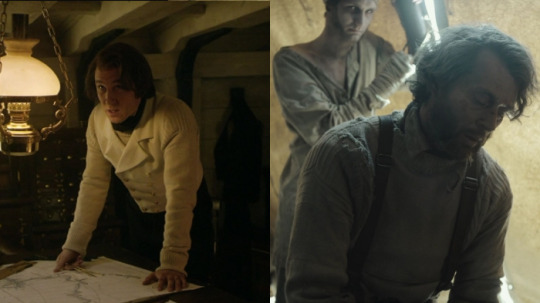
Now, this is a pretty distinctive sweater, especially in an expedition full of grey and navy arans. There are a couple of specific design elements (best outlined in knit-the-terror’s posts) that make it easy to identify The Sweater once it ends up on Le Vesconte: the side cables, the gansey-esque top and bottom, the ribbing patterns on the sleeves. The short neckband also visually distinguishes The Sweater from the cowl-necked white sweater Mr. Collins is wearing (also I think that one gets pretty soundly torn apart when Tuunbaq eviscerates him).
All of this is great and wonderful. However. What I’m most interested in is the cuffs.
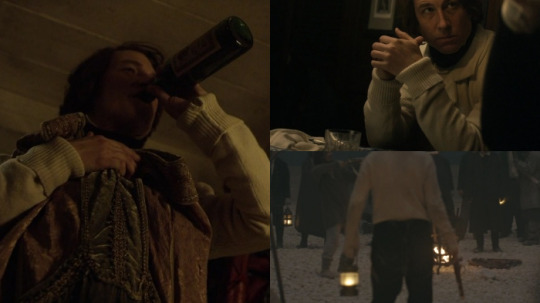
These are double-length cuffs in a 1x1 rib with (perhaps anachronistically) a thumbhole knit in. Fitzjames wears the cuffs folded up most of the time, though if you turn up your brightness and squint you can spot that they’re all the way down at the time of poor Morfin’s death.
The garment construction appears to be such that sleeve was worked flat and them seamed into a tube—the thumbhole then just being part of the seam that wasn’t sewn up. (Why you would make a sleeve like this is beyond me—seaming sucks and it would literally be just as easy to add the thumbhole in when knitting in the round, but I suspect it has something to do with how they produced the no-doubt 10+ versions of this sweater they needed for filming.)
So, we’ve established some key characteristics of The Sweater that help us identify it. We’ve determined that it ends up on Le Vesconte after Fitzjames’ death. (Actually, Le Vesconte’s wearing The Sweater + waistcoat when Fitzjames collapses, so presumably James gives it away before then.) But can we show that anyone else has worn it? (Spoilers: sort of, but also yes.)
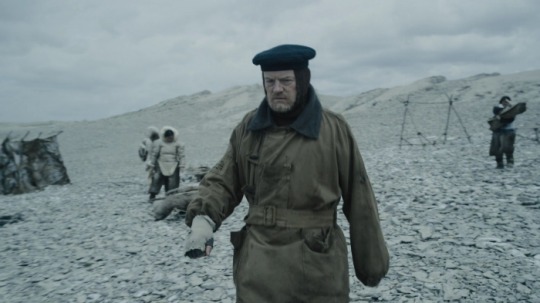
The morning after Silna leaves the Inuit village, when Francis is running around trying to figure out which way she went, he’s wearing the above outfit. His left hand is gone at this point, so his sleeve is tied up at the wrist, but there, covering his right hand… is an extra-long white sweater cuff with a thumbhole.
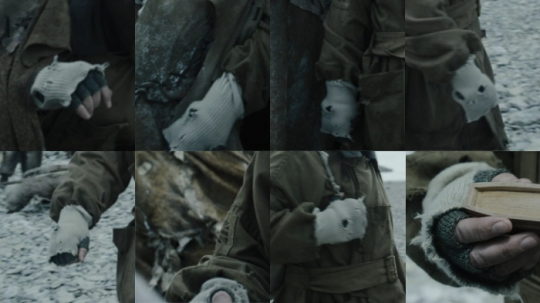
The image quality isn’t great here (the cameraperson decided to focus on the acting instead of a sleeve cuff for some reason) but when you look at all the angles next to each other, the resemblance is pretty obvious. Either there was always another long-cuffed white sweater on the Franklin Expedition that we are never shown, or Francis has at some point picked up The Sweater and is wearing it under his slops.
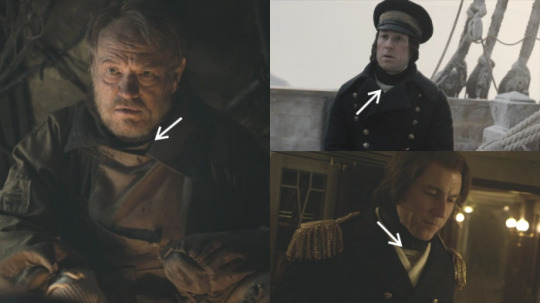
You can see a sliver of neckband underneath all his other layers in the picture above, just like with James.
Now, my main hurdle in 100% proof that this is The Sweater is, actually, also my most definitive proof: the thumbhole. (My gift and my curse…my blessing and my burden...)
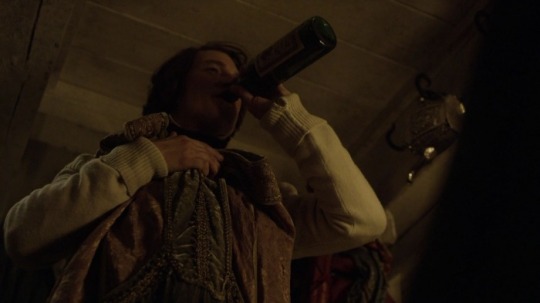
Assuming James hasn’t folded his cuffs to intentionally obfuscate, it’s pretty clear that each sleeve has one—and only one—thumbhole along the inside seam of the sleeve. It’s a logical assumption—I have no clue why you’d put a thumbhole on the outside of the sleeve because, like… that’s not where thumbs are.
By the time Francis is wearing the sweater it’s pretty beat up, so there are a number of noticeable holes in the cuff rather than just the one. (As we see from Le Vesconte’s shot at the beginning of this post, the rest of The Sweater is faring a pretty similar fate. My poor knitter’s heart is weeping.) While some of the holes have a fuzziness around the edges that indicates fraying, there’s still one hole with a cleaner, more finished edge that would indicate its identity as the real, intended thumbhole.
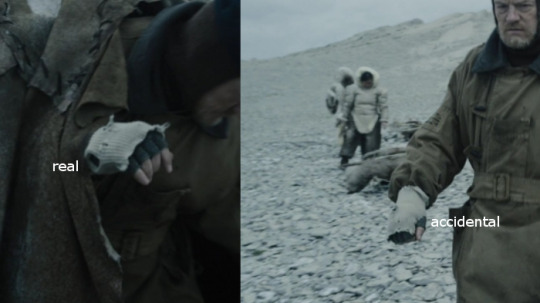
The problem is, it’s on the outside of the sleeve. Crozier appears to be sticking his thumb through another, accidental hole on the opposite side of the cuff. Even if The Sweater was worn inside-out and/or backwards, he shouldn’t be able to wear the thumbhole on the outside—at least, that’s what I thought. Then I tried putting on a sweater with only one hand. (It’s called field research, please don’t judge me.)
Basically, it’s really easy to get a sleeve twisted when you pull on a sweater, especially if it’s made to fit someone with a different physique. Without the opposite hand (or using your teeth, I guess), it’s basically impossible to untwist it, a difficulty that I imagine is compounded if you’ve already hooked your thumb through the cuff in the wrong place. I personally hate the feeling of a twisted sleeve, but Francis has just woken up in an unfamiliar place and honestly at this point in his life he might’ve just shoved the sweater on and called it a day.
Plus, we see the left cuff on Le Vesconte earlier and the thumbhole appears to be on the outside. The sleeves on this sweater are consistently Way Too Long, so it’s possible things just got twisted around whenever an actor would put it on and they left it that way for realism’s sake.
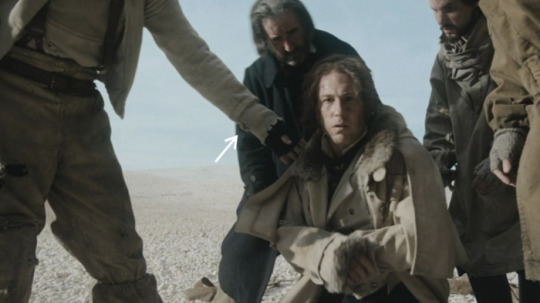
We don’t see Francis in it after the scene in the Inuit village, but like, even if The Sweater was still wearable after another two years, Francis is pretty well covered by his fur parka. (Also… just saying… the emotional implications of a moment where the last remnants of James Fitzjames unravel under his fingertips are uh… pretty juicy.
James has holes in him and so does his sweater.)
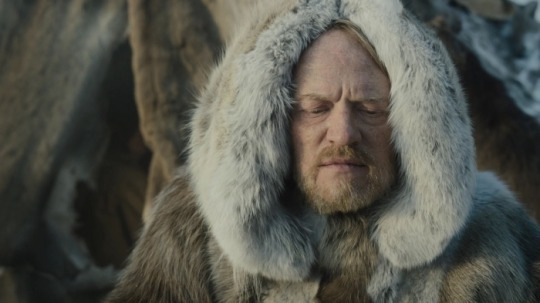
So! I think it’s fair to say that, at the very least, the sweater Francis is wearing is supposed to be the Fitzjames Sweater, as shown to the best of my ability (and screencap resolution). I won’t call it “beyond a doubt” but I think it’s a pretty strong foundation—which is good, because here is where my knit-wear based fever dream starts to, uh, unravel.
My initial assumption after realizing Crozier had the white sweater at the Inuit village was that he pulled it off Le Vesconte after Little’s death. (And idea which cannot help but conjure the morbid image of Crozier undressing a body beset by rigor mortis with one hand…. Or asking Silna for help.)
The tangle in this theory is that I went back and looked at the first few “travelling with Silna” scenes, initially for proof that Francis doesn’t pick up The Sweater until the Little Camp—and found the opposite.
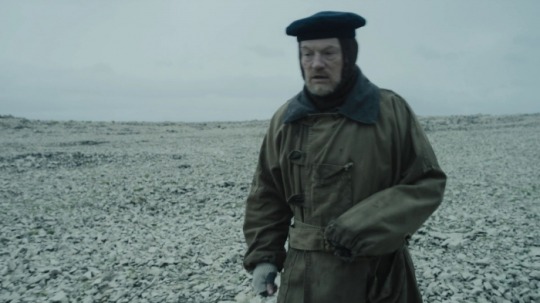
There’s no sign of The Sweater on Francis before the Tuunbaq showdown, but he has somehow acquired The Sweater before finding the body of Le Vesconte. The same identifying features I’m using for the end scene are all there, so. Can’t really deny that. (The best view we get is from the sad dead Jopson hair stroke, which also dates the timeframe a lot better then an ambiguous “Crozier walking around” screenshot.)
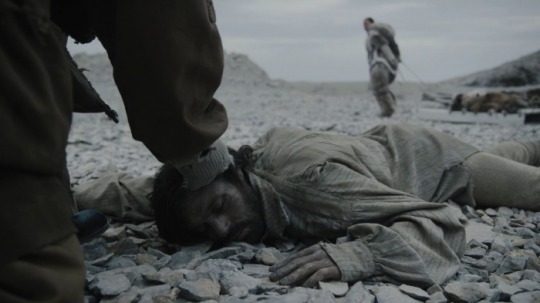
(For what it’s worth, the thumbhole arrangement appears to be done properly this time. Or at least, the hole on the outside of the arm is the frayed “accidental” thumbhole.)
To clarify the timeline:
Fitzjames has The Sweater.
At some point before James collapses, Le Vesconte acquires The Sweater.
Francis is kidnapped by Hickey’s camp. He does not have The Sweater, or at least not visibly.
Le Vesconte (and sweater) leave the sick (including Jopson) behind and head off toward the eventual Little camp.
Tuunbaq showdown. Francis spends some time in recovery.
We can assume that at some point during this bullet point or the next Le Vesconte and buddies die.
Francis and Silna leave the Hickey camp, find the abandoned men and sad dead Jopson. Somehow Francis has acquired The Sweater.
After this, Francis and Silna find the Little camp, presumably including a dead Le Vesconte and The Sweater.
(You could argue that Le Vesconte actually ended up staying with the sick but Francis’ is wearing the sweater when he first sees Jopson so he would have had to have it before finding them.)
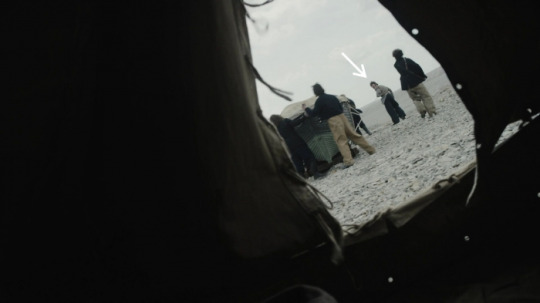
(Also, I have suspicions that this figure leaving the sick camp is Le Vesconte.)
So! There is an indication that, at the same point in time, both Crozier and Le Vesconte(‘s body) were wearing a version of The Sweater. If from this point forward we consider the sweater Fitzjames is seen wearing to be the “true sweater” and the extra to be the “double sweater”, then I see four possibilities:
Option One: Francis already had the sweater double.
Points in favor:
This gives the fun image of Crozier and Fitzjames showing up to the expedition on day one and staring horrorstruck at each other like “we wore the same dress!??!!”
You change. No you change! No you change!!!
Points against:
We see Francis in all kinds of informal dress and never see him wearing it. I’m not actually sure we ever see him wearing a sweater, period. Man hates being cozy, I guess.
There is literally no way costume design would have done this. Like, it beggars belief.
Option Two: Someone else (at the Hickey camp) had an eerily similar sweater that Crozier felt justified in taking.
Points in favor:
It doesn’t show up until he and Silna go back to the Hickey camp, so it’s unlikely that he would have gotten it earlier and just been carrying it around without wearing it.
They did seem to just leave all their stuff lying around, so Francis wouldn’t have to pull it off a dead body, which is a lot more palatable.
If the sweater was a standard “baby’s first officer sweater” present, Hodgson could be a candidate for the true owner.
Points against:
“Baby’s first officer sweater” is just like… not a thing the Victorian Royal Navy did. Also, we never see any of them wearing it, so.
Why wouldn’t the owner have worn it to the Tuunbaq showdown? I get that they’re all wandering around in their shirtsleeves but if someone had a sweater that was remotely still wearable, I feel pretty confident in thinking they aren’t just going to leave it lying around.
Option Three: Actually, Le Vesconte’s sweater is the double.
Points in favor:
Obviously Henry and James got them as best friends forever tokens and whenever they notice they’re wearing them at the same time they spend like, two minutes just hugging each other and saying “bro. bro. bro!”
It absolutely infuriates Francis.
This implies that Francis (or possibly a Hickey camp member but uh… unlikely) got ahold of the Fitzjames version after his death. James isn’t wearing it when he collapses (god… think of the blood stains…), so it would have been as easy as packing it up once he’s dead.
Francis is either in slops or in shirtsleeves after this point so if he keeps the cuffs folded up and his slops collar buttoned (which he does) then we might just not have seen it?
Even if we assume Le Vesconte’s sweater is a different one, there’s still pretty strong evidence James wasn’t buried in his sweater—see the above point, and also the fact that it doesn’t later show up on Hickey’s person. That’s a nice sweater, man, even if it’s fraying, and if I were already stealing a dead man’s boots I would’ve taken the sweater too.
Points against:
Le Vesconte is wearing The Sweater when James collapses—Fitzjames, notably, isn’t. (James mentions the heat as a reason why he can’t keep walking, so he might just not have been wearing it?)
God, guys, I don’t know that much about the Victorian knitting industry but the idea of two bros going out and getting matching sweaters seems… implausible at best.
Option Four: Making a TV show is hard and keeping track of all the details is harder and someone just accidentally put Jared in the sweater five minutes of screen time too early and we were past the time for reshoots and just assumed that no one would be neurotic enough to notice this.
Points in favor:
Script supervisor is like, a really hard job and if this is your biggest slip up then honestly? Who even cares.
Points against:
I care. I care very much.
But which option could be the truth? What conclusions have we formed from this tedious trek across the frozen wasteland of HD screencaps? What horrors have we (me, literally just me) wrought in the name of split-second costume design based character choices? Could Crozier have somehow gotten The Sweater from Le Vesconte after Tuunbaq dies but before reaching Little’s camp? Is there another, actually viable explanation for the mystery of the twin sweaters? How many good fics/headcanons could come from any of these options? I don’t know! Please discuss!
(For however much it matters: my personal favorite is Option Four. None of the others seem a terribly plausible story justification, and also I like the emotional weight of Francis picking up the sweater as a memento of JFJ—or the intention of it, even if continuity gets a little screwy.
Also, if no one writes fic about this then I will be forced to and who really wants that?? Write this fic for me and save us all the turmoil.)
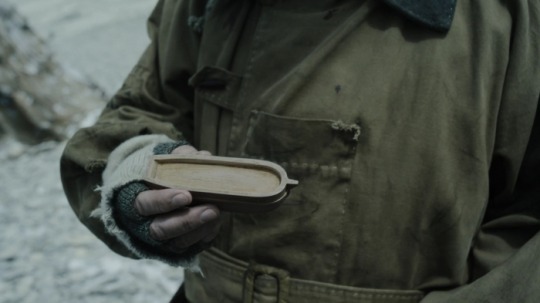
(A thousand props to @knit-the-terror for sussing out enough details that I could even make an argument focused around the cuff of a sweater. Please forgive my corrupting your research for a frantic fever dream rant about something that mostly doesn’t matter.)
#this is my magnum opus and my greatest shame#the terror#meta analysis#james fitzjames#henry le vesconte#francis crozier#that sweater lasts longer than most of the cast#and I love it just as much
470 notes
·
View notes